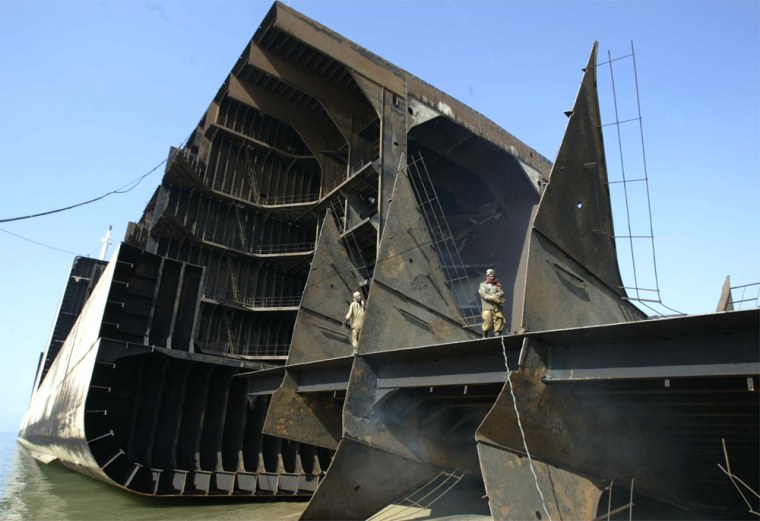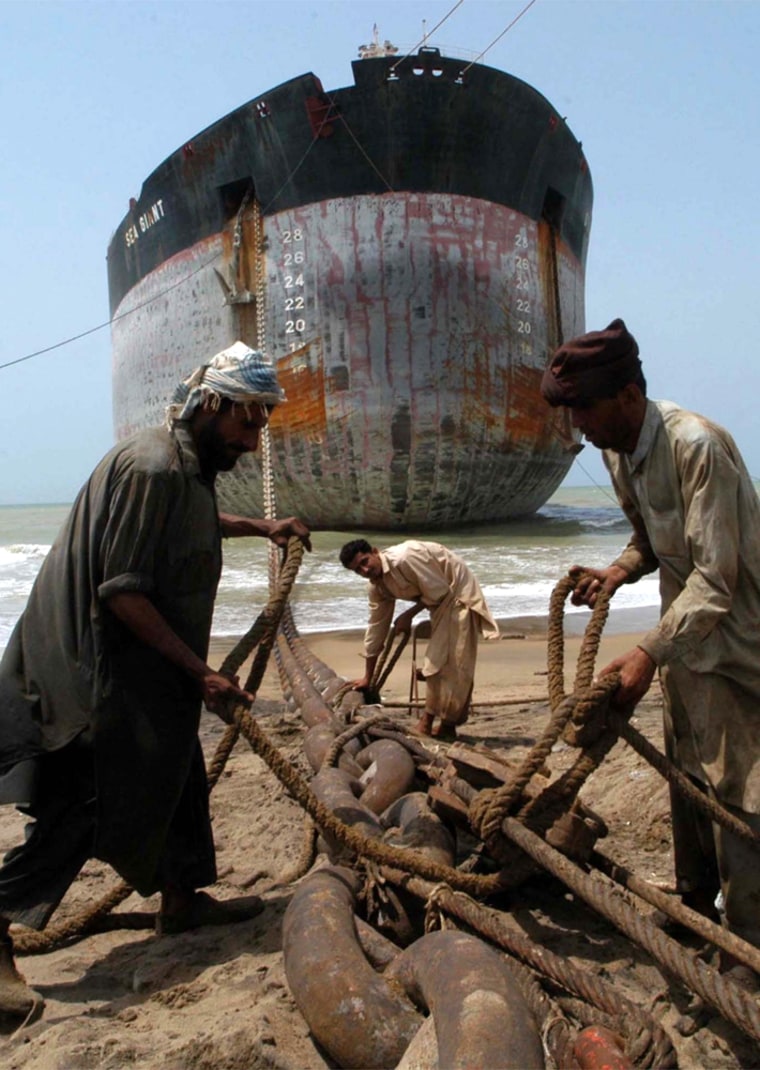Dying piece by piece, the beached supertanker looms over the shore, a skeletal Colossus almost too big to be imagined, and a cash cow heralding a rebirth for the country’s controversial ship-breaking industry.
The French-made Sea Giant, at 74,400 metric tons the second biggest ship ever built, is being taken apart at the sprawling Gaddani complex, a 10-mile stretch of sand-turned-junkyard west of the port city of Karachi.
Labor organizations have denounced working conditions at Gaddani, and international environmental groups like Greenpeace fear the rebound in ship-breaking will be a disaster for the ecosystem along the Arabian Sea coast.
But laborers by the hundreds have begun turning up from all over Pakistan, hopeful that more floating behemoths will find their final resting place here.
Hundreds of men — bathed in sweat and clothed in ragged, oil-stained shalwar khameez — scurry around the half-dismantled hulk of the Sea Giant like ants swarming over an abandoned picnic basket.
They work for $2-$3 a day, in line with Pakistan’s average wage, with no safety gear and no health plan — and they are thankful to have the job in a country where unemployment is rampant.
“All you have to do is tell one person in the village that a ship has arrived and the next day the entire place will empty of men, all rushing here to see if they can find a job,” said Mohammed Uzair, a laborer.
Industry incentive
The ship, which once carried Saudi oil by the hundreds of millions of gallons to the United States, is mammoth: It soars 110 feet out of the water and is 1,360 feet long, about 100 feet longer than the Empire State Building is tall. Built in 1979, it had reached the end of its serviceable life and would have been hard to insure if it had stayed in service.
The Sea Giant arrived at Gaddani in September, the biggest catch so far among the old tankers that have come in since the government of President Gen. Pervez Musharraf cut taxes on Pakistan’s ship-breaking companies by about a third.

Still, the eight ships lying on the long beach are a far cry from the dozens that clogged the shore during Gaddani’s heyday in the 1970s, when 35,000 laborers were on the job. Several thousand work at the ship-breaking yards today, competing with yards in Bangladesh, China and India.
But industry leaders predict better times ahead.
“The tax break has brought the ship-breaking industry out of the inertia its been in for the last few years,” said Ikhlaq Memon, chairman of the Pakistan Ship-breaking Industry and the businessman who paid $17 million to buy the right to break up the Sea Giant for scrap to sell to steel mills. “I am foreseeing a better future for the industry here.”
Activists oppose
That prospect worries environmentalists, who are already grappling with the damage from a July oil spill that dumped more than 4 million gallons of crude in Karachi, blackening beaches and killing untold fish and other sea life.
“If the ship-breaking industry is revived, it will be an environmental disaster,” said Tahir Qureshi, in charge of coastal and marine ecosystems in Pakistan for the Swiss-based International Union for Conservation of Nature. “These ships will blacken the land and the air and dump dangerous chemicals into the sea.”
Greenpeace calls the ship-breaking business “one of the most deadly in the world,” noting the old ships hold large amounts of toxic chemicals, asbestos and heavy metals. Disposal is subject to strict regulations in Europe and the United States, but no such rules are enforced in Pakistan or the other major ship-breaking countries.
Shaheed Patel, the foreman in charge of scrapping the Sea Giant, said Pakistani ship-breakers have cleaned up their operations, although he acknowledged environmental standards are not high in Pakistan.
“There was a time when we used to dump the sludge into the sea without any care,” he said. “But now we take the chemicals and dump them properly. We take every possible precaution.”
Patel said heavy metals and asbestos are all dealt with properly, too, though his assurances were belied by the dead fish washing up on the beach.
Job hazards
The hazards are not just to the environment.
Laborers rush about at their tasks, weaving around giant piles of scrap. Dozens of other workers cut away at two-ton slabs of metal with acetylene torches while enormous steel plates capable of squashing a man swing near their heads. No one wears a hardhat.
By far the hardest and most dangerous job is done by the welders who work inside the hull, dangling in total darkness amid overpowering fumes from oil and the gas from their torches.
“I can only go for two hours at a time and then I need a break,” said Taj Mohammed, a compact 35-year-old who had just emerged from a recess of the Sea Giant’s hull. “When I start to suffocate I come out.”
Mohammed said he had seen men overcome by fumes and fall to their deaths and others injured by exploding gas tanks, though none while working on the Sea Giant.
Patel, the foreman, said the company pays $3,300 to the families of those killed and for the cost of getting the body home.
There is no medical facility at Gaddani and just one ambulance to take injured men on the hour’s drive to a hospital in Karachi.
A laborer named Mobeen said he was working on another tanker in October when a cable snapped and severed the leg of a man standing next to him.
Mobeen’s foot was broken, but two months later, he was back at the Gaddani yards, where he has worked for 22 years.
“Yes, it is dangerous work,” he said, wiping his face on a blackened sleeve. “But there is no other work we know how to do. We are helpless.”
